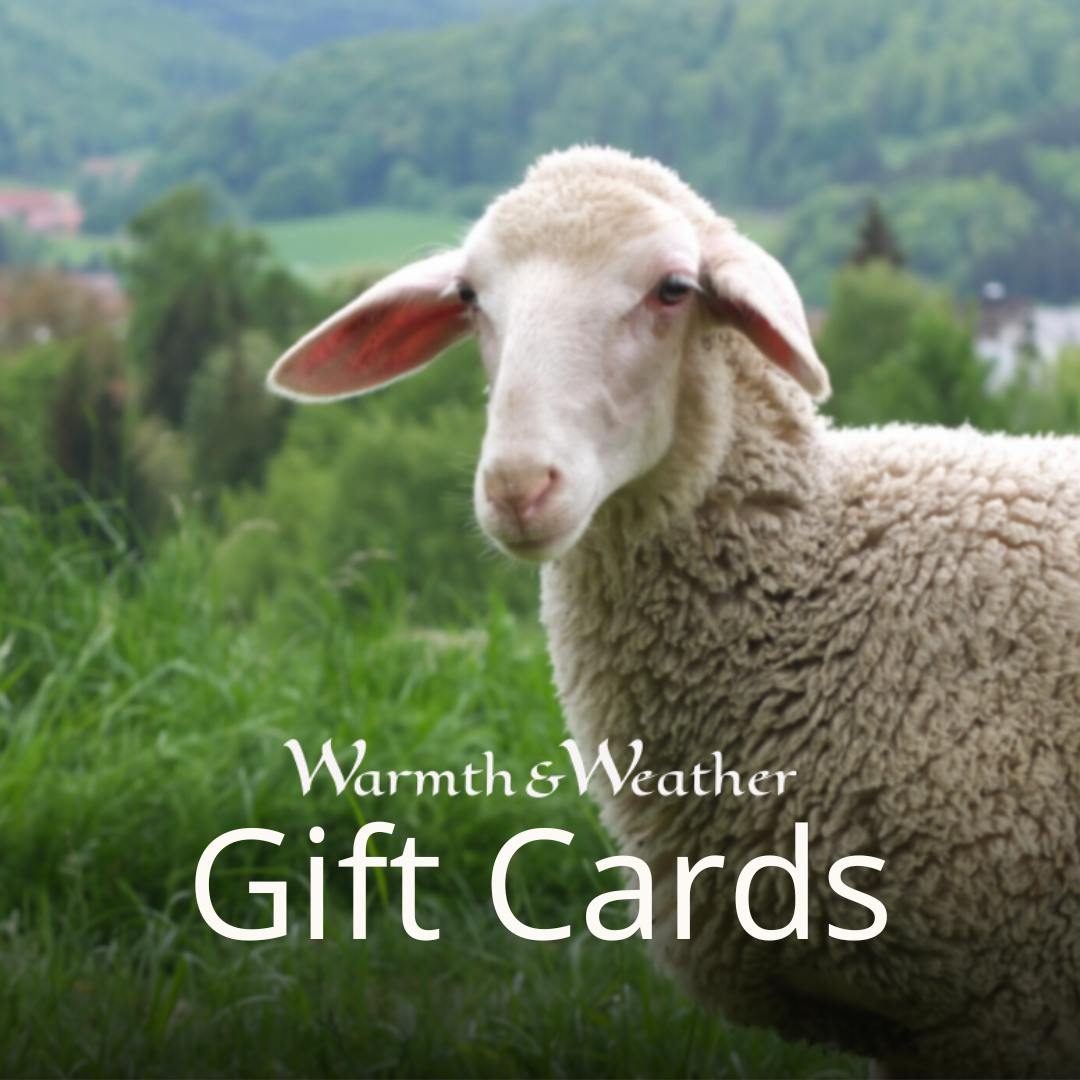
Did you know that only 1% of the Global Wool Industry is Organic and Regenerative?
At Warmth & Weather, we are conscious consumers. We recognize that health in our bodies is directly linked to the health of our environment and the products we use every day. We want to feel a connection to where our clothes are made and how they are made, and here’s what we sell: we import six different brands of organic merino wool clothing, and one brand of ethical rain wear. Our merino wool brands are Disana, Pickapooh, Reiff, Engel, Hocosa of Switzerland and Hirsch Natur. Our ethical rainwear line is BMS.
Our Co-Founder Heather started building relationships with these companies almost twenty years ago, when she was working as a Waldorf Kindergarten Teacher and saw first-hand the benefit of dressing children in wool. Sensitive to the chemicals used in industrial processing, she searched for companies that were producing fine organic wool garments. Merino wool is one of the finest and softest because of the smooth long hairs. The companies she found making fine organic merino wool garments were all in Europe. She set up a small shop in a shared community space next to a church and began to sell products. She would wait weeks and months for the boxes to arrive. (One of our first Disana collections shown below.)

In the past twenty years, a lot has changed. Heather’s mission to bring warmth to families and encourage the whole family to get outside has not. Our European merino wool brands get their raw wool from the same company: Südwolle Group. Their organic raw wool is grown in South America using regenerative agriculture; our makers buy the raw wool and process it into yarn, and then knit in their own proprietary ways. Excellent craftspeople and innovators, our brands have developed knitting machines and methods for working with the fine, thin strands of merino wool. For instance, Disana boiled wool clothing is made in a unique way. They first knit the yarn then boil it down to create a thick boiled wool sheet, from which they cut patterns. Reiff’s boiled wool sweaters are made in a completely different way, and the feeling and style is totally different between the two.
But wait – what does all of this have to do with World Soil Day?

World Soil Day was created by the UN to bring light to the desertification of the planet.
Steiner wrote, “There is practically no field of human endeavour that does not relate to agriculture in some way”, and never is it more true than with fashion. Many have forgotten that all clothing is a product of nature, and our methods of production make a huge impact.
The global fashion industry is a behemoth 2.5 trillion dollar industry responsible for 20% of industrial water waste and 10% of global carbon emissions – more than all international flights and maritime shipping combined. Meanwhile, 80% of all fabrics and textiles end up in landfills. Unfortunately, consumers are so detached from what their clothes are made of and how their clothes are made, they do not realize that the low cost of a chain store t-shirt has a very high cost on the environment. Workers are often forced to work in dangerous conditions and handle toxic chemicals used in industrial textile processing, and the standard wool industry is not exempt. Industrial methods of processing wool are incredibly water intensive and they use acid to flush the “ruminants” – the matted dirty, kind of gross raw wool that gets lots of sticks and debris in it. This is one reason why many people can’t wear industrial wool or feel they have a “wool allergy”. In most cases, it is the chemicals used in the wool processing that they are reacting to.
Wool is generally considered a sustainable choice due to its biodegradability and “soil to soil” life span, but dig a little deeper and there are serious ethical concerns. Industrial wool sheep farming has wrecked environmental havoc. When sheep farmers keep thousands of sheep in close quarters without rotation, desertification results from overgrazing, and soil degradation and water contamination occurs. This is where our topic of World Soil Day comes full circle.

Südwolle Group uses regenerative agriculture on their sheep farms. You can go on the Südwolle Group website and download their certificates here. They are GOTS and OEKO certified. They are also members of the FSC Forest Stewardship Council, whose goal is to protect healthy and resilient forests for all, forever.
Merino sheep thrive in more temperate climates like New Zealand, Australia and South America. We don’t have merino sheep farms here in Canada because merino sheep, while adaptive, won’t survive in our extreme winter climate. This is why brands like Simply Merino import their organic merino wool from Australia.
The Patagonia region of Argentina was once incredibly rich in diverse species. However, industrial sheep farming has caused massive desertification of this unique and complex grassland. Argentinian farmers have been forced to abandon roughly 20 million acres due to desertification. Wool farmers are turning to regenerative agricultural methods as the answer. Farmers are realizing how beneficial grazing can be if done with rotation, so that grass can be restored and soil health maintained and improved.
Slow fashion is the widespread reaction to fast fashion and its environmental impact, the argument for hitting the brakes on excessive production, overcomplicated supply chains, and mindless consumption. It advocates for manufacturing that respects people, the environment and animals.

Connecting consumers with the farms and people that make their clothes enlivens the relationship between human and nature and producer and consumer. At Warmth and Weather, we make sure our values can be found at the very beginning of the production chain and are carried through to the end. From farm to loom to warehouse to you.
Land degradation accelerates climate change. What the world needs now is healthy farms producing healthy products. On World Soil Day, we recognize the importance of soil health, and hope our transparency inspires you to think about what your clothes are made of and the many hands that have cared for the Earth when you buy our merino wool products.
Happy World Soil Day!
Kate Heming, Creative Marketing Manager, Warmth and Weather.

Sources:
https://wavefibremill.com/wave-handmade/field-woollens/
https://www.un.org/en/observances/world-soil-day
https://sustainablefoodtrust.org/news-views/biodynamic-farming/
https://www.youtube.com/watch?v=WKeTuoZT6jI
https://earth.org/fast-fashions-detrimental-effect-on-the-environment/
https://www.theguardian.com/sustainable-business/patagonia-sheep-grass-ranch-savory



